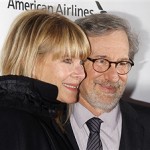It’s everything you thought you knew about Steven Spielberg – and a whole lot more. In less than the running time of perhaps his most critically acclaimed film, “Schindler’s List,” a new documentary takes a deep dive into the life of a filmmaker who began to indelibly shape and change popular culture more than 40 years ago with the summer blockbuster “Jaws.”
The two-and-a-half hour film, titled simply “Spielberg,” premiered at the New York Film Festival last Thursday and on HBO over the weekend.
The notoriously private Spielberg, normally behind the lens instead of in front of it, sat for nearly 30 hours of interviews over a period of a year with another acclaimed director, documentarian Susan Lacy. Lacy joined HBO after a lengthy career at PBS where she created “American Masters” in 1986 and executive produced biographies on luminaries from Albert Einstein to Lucille Ball and F. Scott Fitzgerald to Janis Joplin, garnering a slew of Emmy and Peabody awards along the way.
As Lacy elicits from Spielberg at the outset of the documentary, his legendary career path all began with the classic film “Lawrence of Arabia,” and how he saw it over and over again as a nerdy kid growing up in Phoenix, Arizona. It inspired him to start directing his own films, 8mm movies in which he recruited his teenage friends as actors.
“Although I knew his films, it wasn’t until I stepped back to examine them as a body of work that I realized what a risk-taker he was,” Lacy said in an email interview. “Beginning with ‘Jaws’ and the decision to shoot the film on the ocean, to ‘Close Encounters of the Third Kind,’ to ‘The Color Purple,’ to ‘Schindler’s List,’ to ‘Jurassic Park’ to ‘Munich,’ Steven has consistently pushed the envelope technically and in his choice of material. It’s surprising because he is thought of often as a safe filmmaker.”
The interviews are revealing, particularly when Spielberg speaks about his parents and his turbulent family life, including his shame of being Jewish. Later in life, as a result of his experiences shooting “Schindler’s List” in Poland and in Israel, he came full circle back to his faith when he established the Shoah Foundation, which records the testimonies of people who survived genocide and their descendants, not only during the Holocaust, but during massacres in Armenia, Rwanda, Guatemala and Nanjing, China.
Spielberg also credits much of his renewed faith to his second wife, Kate Capshaw, who converted to Judaism. Although Capshaw is not interviewed in the documentary, viewers hear from his sisters and both of his parents, who reunited before his mother passed away early this year. He discusses his first marriage, to actress Amy Irving, very briefly.
But the vast majority of “Spielberg” is naturally about his movies, films that have made him the most successful and popular director in movie history, as famous as the top stars who appear in them.
The documentary takes a sweeping overview of 28 Spielberg-directed titles, with back stories from not only key actors like Tom Hanks, Liam Neeson, Cate Blanchett, Drew Barrymore, Daniel Day Lewis, Christian Bale, Laura Dern and Harrison Ford but from composer John Williams and fellow directors that came up at the same time, like Francis Ford Coppola, Martin Scorsese and particularly George Lucas, whom he credits with resuscitating his career by bringing him into what became the massively successful “Raiders of the Lost Ark” franchise.
“Some of the consistent observations from the many people I spoke with are their almost universal amazement at Steven’s innate understanding of the language of film and its emotional impact on audiences—and also his complete mastery of every element of filmmaking, especially his ability to edit the film he is making in his head as he is shooting it,” said Lacy.
Yet Spielberg’s oeuvre is so broad and deep that not surprisingly, along with the blockbuster popcorn fare and escapist fantasies of the Indiana Jones films, “Jurassic Park,” “Close Encounters of the Third Kind” and “E.T. the Extra-Terrestrial,” the more serious films are given lots of play in the documentary, like “Saving Private Ryan,” “Lincoln,” “Munich” and “Bridge of Spies,” mirroring the awards bestowed upon them.
Spielberg famously won his first directing Oscar for 1993’s “Schindler’s List,” at which point he had been directing films for almost two decades.
The filmography chronicles the evolution of a young creator who developed into a master craftsman and entertainment mogul—and how the filmic themes of optimism, independence and familial relationships, particularly between father and son, mirror those in his personal life.
“The primary themes which emerged from my interviews with Steven and which manifest in his work are understanding of the outsider, a theme which comes out of his own loneliness and the anti-Semitism he felt growing up, the separation and reunification of families and the individual versus indomitable forces of nature, society or the ‘other,’” Lacy said.
Many may not remember—or know—that Spielberg got his start in television after the apocryphal story of his sneaking onto the Universal lot and establishing an office there– and getting powerful executive Sid Sheinberg to be his mentor. Sheinberg signed him to a seven-year television contract in which his first job was directing Joan Crawford in Rod Serling’s “Night Gallery,” a feat Spielberg compared to pitching to Hank Aaron your first time on the mound.
Even in 147 minutes, it’s challenging to sum up the life and times of Steven Spielberg and the impact of his work, but Lacy summarized it by saying, “Perhaps his greatest legacy as a filmmaker is his ability to be commercially successful and be an artist at the same time. As Coppola said, that’s a talent you have to be born with. The extraordinary diversity of memorable and lasting films he has given us is testament to that.”
(“Spielberg” runs Tuesday October 10 at 5 p.m. PT on HBO, and is available on HBO NOW, HBO GO and HBO on Demand.)


